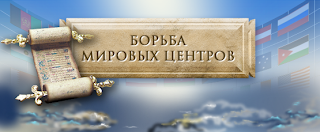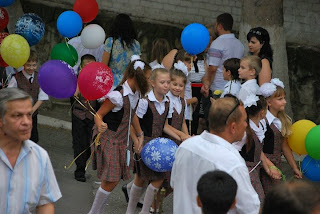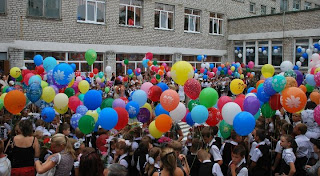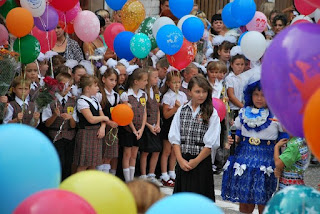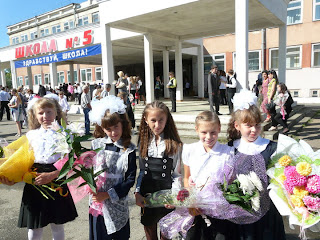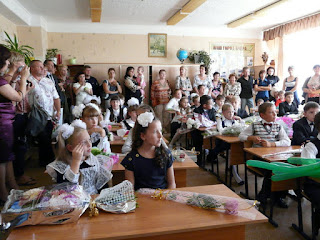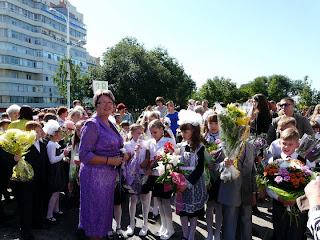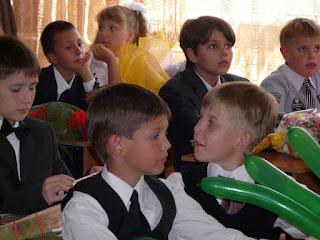— The very Israel’s existence disposes no other resources rather than Israeli citizens and the world-spread Jewish diasporas. As for me, I don’t see any positive prospect in that, as long as the logic itself prompts sides to the struggle for total victory with the latter destruction of the lost side. I believe that the Israel’s collapse is inevitable. Country is in the face of the demographic situation that plays into the hands of their neighbors and the irreversible turning point is to come very soon. Without the American shield — that is obviously lowering already — this state will undoubtedly decease…
I believe that the most part of Israeli population (the Russian-speaking one) might come in handy to Russia — why not to use the repatriates of Birobijan in order to develop, say, Far East? It seems to me that the presence of active Jewish (Judaic) community at its territory would answer the Russian purposes quite well — just the same way it is with other various religious communities (Protestants, Catholics, Buddhists, Muslims).
— Should we expect radical changes in Afghanistan?
— Without any doubts, Western occupation is moving toward its resume that is similar to the results of the Soviet occupation. Long story short, nothing essential will change. In the meanwhile, “Talibs” (according to Alexandre Latsa, the very actuality of this term raises certain doubts) are little by little establishing their control over the country regions. And I see no other possible scenarios: Afghanistan is to remain the country of military lords, clans, tribes and Kabul where — even under the auspices of Western occupation — it turned out to be impossible to introduce fast-food restaurants and cinemas, showing the Hollywood fables. We may use the occasion to congratulate the Afghani loyalty to “their kind of freedom”.
In my opinion, there’s also a risk of the regional explosion. Troops, trained against the NATO soldiers in the real combat — in case if the latter would be pulled out of the country — may find themselves new goals and the “arena of actions”, destabilizing the weak states of Central Asia and, accordingly, Russia itself.
— What is the probability of American or Israeli strikes against Iran in your opinion?
— I don’t believe in the possibility of conducting a strike right against Iran. I believe that this can’t be done as long as it would have set the whole region on fire and I doubt that U. S.-Israeli coalition aims at unleashing the war. From the other hand, I don’t believe these “substantial” Iranian threats to Israel to be real at all. No kidding — Iranian officials are not self-murderers. Iranian nuclear program was supported by America and Europe since 1950s and by Russia since 1979, long before Ahmadinejad.
Theoretically, Iran’s desire to have a nuclear weapon (in the likeness of several other states) has nothing to do with the statements about “destroying Israel”, which is something that a lot of Muslims — especially the Palestinian ones — desperately desire. I can ascertain that anti-Iran cooperation is perfectly systematized but the only possible solution is the discussion, not the sanctions. And here you go — the desired example of European lack of strength and unity — otherwise it could have made everyone to listen to it and support Russian efforts to organize the negotiations with Tehran.
— Should we expect any further strengthening of anti-Iran sanctions?
— Obviously, Western society, dancing to the American tune wants to fund the Israeli power furthermore. And we have to expect the further strengthening of sanctions against Iran. But let’s be serious at last: what are they for? And even the more important question: what’s next?
— What, in your opinion, the position of Georgia and Azerbaijan would be, if the warfare against Iran are actually to take place?
— Azerbaijan has a long-term dispute with Iran that they’ve decided to dim a little because of the conflict with Armenia. Azerbaijan is playing the geographic party of the Caspian Club and has the common border with Iran. I believe that this country is quite “neutral” as opposed to Georgia, which nationalistic government seems to be too pro-Western to me. Georgia has broken up the diplomatic relations with Iran due to some make-believe occasion, as long as it urges to be a dog at the U. S.-Israeli leash, preferring them to Moscow and Iran. We also have to take persistent Georgian desire to enter NATO into consideration — it believes its possibility to be more likely, had it been ready to take part in the military enterprises, threatening to destabilize the entire region. This includes the warfare against Iran as well as the fact that Georgian authorities are the children of color revolution. But still, I don’t really believe into the possibility of using the military scenario against Iran.
— What do you think about the whole situation at the Russian Ciscaucasia and the entire situation at the Caucasian region in general?
— Attempts to destabilize the situation in the Caucasus from the outside have been taking place for a long time and they continue today. Natalya Narochitskaya has perfectly explained at one of her papers that the Baltic-Black Sea arc has a strategic value for those who want to surround and weaken Russia during the “Great Game’ and gain access to the respective energetic corridors. Russian Caucasus is a one of the most important parts of Russia and non-Russian Caucasus is a pledge for the geopolitical stability of that region that borders Russia. Accordingly, Caucasus is the indispensable object for different kinds of ill-wishers (Prometeists, Americans, Wahhabites) to influence the situation. Caucasus is one the main keys to the Russian “tomorrow”.
Recent events like two wars in Chechnya, war in Ossetia in 2008, wars in Ingush Republic and Dagestan give the grounds to assume that Russia is not going weaken its presence in the region even a jot. And that’s good. Federal project “Strategy of social-economic development of Ciscaucasia until 2020” seems to be a wonderful initiative to me.
— Mr. Latsa, what would like to say to Russian readers as a conclusion? What important matters of Russo-French relationship would you like to draw attention to?
— I often read the Russian news and I think that the degree of degradation of two countries (Russia and France) is incomparable. Impoverishment of the French population during last 10 years had a huge impact, economics is unhealthy, unemployment became reality for 12% of the population and about 8% are just not taken into account by the statistics. At that, lack of political “will” of the government mutilates the country; its condition is highly explosive at the moment. In the nearest future France risks to fetch itself in the middle of the civil war. Suburbs have turned into ghettos, which population has mostly African or North African origin. Distinctive feature of this population is the counter-culture of hatred and destructive attitude toward France and its institutions. This is a mix of American culture of violence, rap, guns and the post-colonial revanchism.
Riots take place on a regular basis and about 40.000 cars are annually burnt in France so the government decided not to publish these numbers in order not to worry the people. Uncontrolled immigration, combined with the mentality of colonialism victims, authorities lacking the political opportunities and the will to solve the situation, will eventually lead to the aggravation of these discords. And mind that the same situation is unfolding in England, Belgium, and Holland…
This internal impotence of the European states quite correlates with their foreign-policy powerlessness. Neither political conscience, nor realistic worldview characterizes the European community anymore. I think that NATO is the only power, holding the European countries together. And as long as this institution is moving towards its collapse, quite soon European states would have to look for another pole of power, capable of playing the role of a director who would save the EU from destruction. It’s obvious that Russia may become such pole within a united Greater Europe, lying from the Atlantic to the Pacific Ocean.
Interviewed by Marat Kunaev
Translated from French
